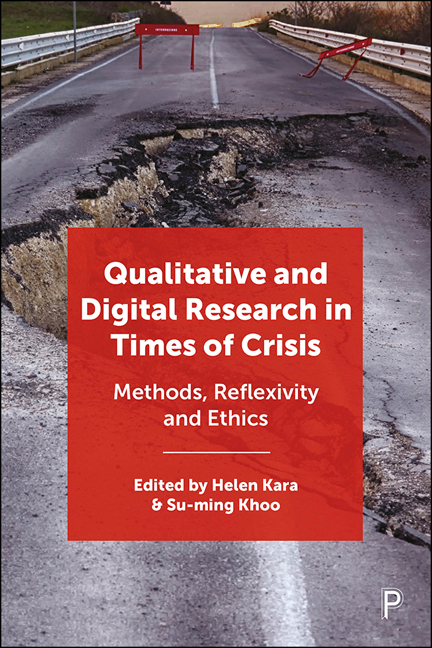Conclusion
Published online by Cambridge University Press: 13 May 2022
Summary
In this conclusion, we summarise some lessons from the examples and experiences in the preceding chapters, and in the e-books we edited on ‘Researching in the Age of COVID-19’ (Kara and Khoo, 2020a,b,c). We remember that crisis has two meanings: a sudden occurrence, such as a ship running aground, or a turning point, marking either recovery or deterioration during an illness. We also note that crisis can be fast or slow, one-off or recurrent, and that all these aspects of crisis can interact in complex ways. We offer some recommendations for doing research in times of crisis, and suggest some future directions for the development of methods and ethics in this arena.
The first lesson is that ethics come into sharper focus in times of crisis. We see evidence of Whyte's (2020) ‘epistemology of co-ordination’ in action throughout the whole book, particularly in the form of an emphasis on prioritising relationships, including taking more care of individuals, communities, and ourselves. We see increased connectedness with and care for participants in Hien Thi Nguyen and her colleagues’ work with older Vietnamese migrants, and increased care for communities in Aisling Walsh's work on the aftermath of colonialism and conflict and their intersection with patriarchy. There is concern for researchers’ well-being in Gbenga Shadare's sobering reminder that in some crisis situations researchers’ lives may be at risk, and so methods such as covert research, that may otherwise be questionable, become necessary. Bibek Dahal outlines the layers of complication that can arise when a researcher's topic is ethics and they find themselves caught up in a crisis that requires an ethical response. In Gretchen Stolte and Lisa Oliver's work, we see discovery in the making of connections between First Nations women, and opportunities for yarning, reweaving connections to land, community, and knowledge, and to share survivorship and healing. In sum, this book speaks to Van Brown's call to expand the ethical frame of concern in research through ‘methics’ (Browne and Peek, 2014).
The second lesson is that crises promote creativity, reflexivity, and relationality in research.
- Type
- Chapter
- Information
- Qualitative and Digital Research in Times of CrisisMethods, Reflexivity and Ethics, pp. 247 - 252Publisher: Bristol University PressPrint publication year: 2021

